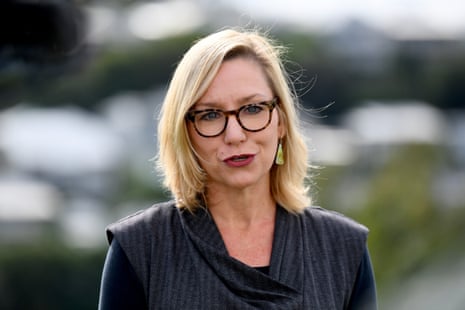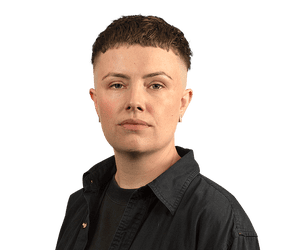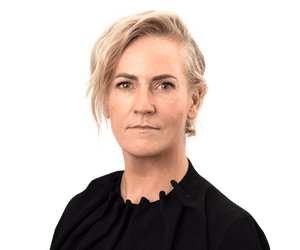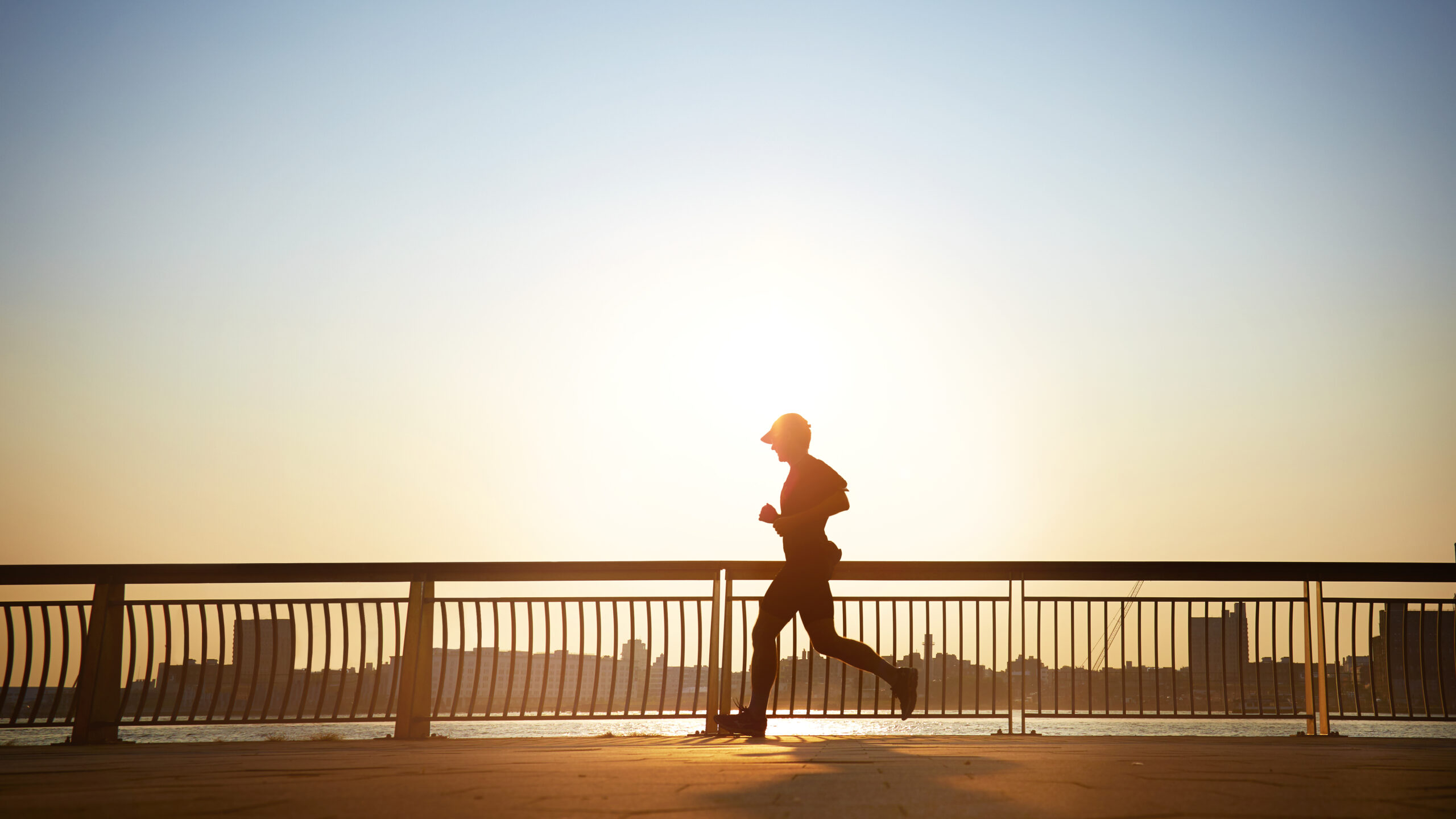Larissa Waters says Cox told her of defection an hour before presser with PM, but ‘no animosity’

The Greens leader, Larissa Waters, said she had a “calm and measured” conversation with senator Dorinda Cox an hour before she defected to Labor yesterday, saying people need to have their “values fit with the party they seek to represent”. Waters told ABC News this morning:
Dorinda called me an hour before her press conference with the prime minister. And we had a very calm and measured conversation about it. And I did genuinely wish her all the best. There’s no animosity there.
It’s disappointing for us to lose a Greens senator. But Dorinda says her values lie there. You need to be true to yourself, don’t you?
Waters did hit Labor’s green light of the extension of the North West Shelf gas project when speaking about the party’s values.
What with Labor having decided just this last week to approve an absolute carbon bomb off the coast of WA, which would not only have massive climate impacts but which would have huge impacts on ancient rock art. Those values are not consistent with Greens values.
Key events

Patrick Commins
Minimum wage will be $24.95 an hour and $948 for a full-time week
That minimum wage increase will equate to $24.95 an hour or $948 for a full-time work week. That’s up from $915.90 a week.
Minimum wage to increase by 3.5% from July

Patrick Commins
Australia’s minimum wage of $24.10 an hour will be increased by 3.5% from July, in a decision by the Fair Work Commission that delivers a real wage increase for the country’s lowest paid workers.
Last year’s decision was for a 3.75% increase.
Nearly 3 million employees have their pay set by an award and are directly affected by the annual minimum wage determination. The number of Australians paid the minimum wage, however, is a fraction of that – below 100,000 people, according to government estimates.
The government had argued in favour of a decision that did not send workers’ wages backwards, and the final result falls between the competing demands from the peak union body and business groups.
Inflation was 2.4% in the year to March, and the Reserve Bank recently predicted it would ease to 2.1% by June. But the RBA also expects the end of government cost-of-living support payments, such as energy bill subsidies, will see inflation accelerate to 3.1% by mid-2026.
The ACTU argued in favour of a 4.5% lift, while business groups had made the case for an increase of around 2.5% or lower, arguing that firms were struggling with sharp increases in operating costs.
The Australian Restaurant and Cafe Association, in an industry with a large share of employees on awards, had argued the minimum wage should increase by no more than 2% this year.
Larissa Waters says Cox told her of defection an hour before presser with PM, but ‘no animosity’
The Greens leader, Larissa Waters, said she had a “calm and measured” conversation with senator Dorinda Cox an hour before she defected to Labor yesterday, saying people need to have their “values fit with the party they seek to represent”. Waters told ABC News this morning:
Dorinda called me an hour before her press conference with the prime minister. And we had a very calm and measured conversation about it. And I did genuinely wish her all the best. There’s no animosity there.
It’s disappointing for us to lose a Greens senator. But Dorinda says her values lie there. You need to be true to yourself, don’t you?
Waters did hit Labor’s green light of the extension of the North West Shelf gas project when speaking about the party’s values.
What with Labor having decided just this last week to approve an absolute carbon bomb off the coast of WA, which would not only have massive climate impacts but which would have huge impacts on ancient rock art. Those values are not consistent with Greens values.

Benita Kolovos
Victoria Treasury hasn’t modelled impact of credit rating downgrade
Now that the Victorian budget has been handed down, attention turns to budget estimates. The public accounts and estimates committee hearings began this morning, with the treasurer, Jaclyn Symes, and senior officials from the Department of Treasury and Finance appearing as the first witnesses.
During an exchange between the Treasury secretary, Chris Barrett, and Liberal MP Richard Welch, it was revealed that his department has not conducted any modelling on the potential impact of a credit rating downgrade.
Barrett said the department does model scenarios involving interest rate rises up to a “100 basis point increase” and its impact on the budget. He said rate increases would be the result of a credit ratings downgrade.
Victoria currently holds the lowest credit rating of all Australian states, after downgrades in the wake of the pandemic due to its rising debt levels.
Symes said Monday that ratings agencies had “provided positive initial feedback in relation to this year’s budget”, which shows net debt declining as a proportion of the economy and that the government is “moderating” its infrastructure pipeline.
She also revealed she will meet with ratings agency Moody’s this Friday.
Seven people charged in alleged import scheme linked to 300kg of illicit drugs, 20m cigarettes
Police have charged seven men following a years-long investigation into allegations a criminal group used trusted insiders to import illegal products into Sydney.
A strike force was established in 2023 to investigate allegations that a man, 42, was importing large quantities of illegal drugs and illicit tobacco while allegedly claiming he had the ability to get around border controls. Police later discovered an industrial cooler imported from Canada in July 2024 that contained more than 280kg of liquid methamphetamine.
The man allegedly also used a freight forwarding company to import more than 20 million cigarettes from the United Arab Emirates. Police also alleged the man planned to import 50kg of cocaine in a shipping container from Panama in May 2025, allegedly disguised in cement bags.
The 42-year-old has since been arrested and charged with multiple counts of importing large quantities of tobacco and the attempted import of a commercial quantity of a border controlled drug, among other charges. He will appear in court in late July.
Six others with alleged links to the import plans also face charges.
Lifeblood in urgent need of O-type blood donations
Lifeblood has issued an urgent call for an extra 9,500 donations of O positive and O negative blood in the next seven days. The Australian Red Cross says O-type blood supplies are at their lowest levels since October 2023. Lifeblood’s executive director, Stuart Chesneau, said:
Every day, we issue close to 10,000 blood transfusions and medications to hospitals around the country to meet patient demand and we can’t do it without people donating.
O-type blood is the most frequently ordered by hospitals and can be used in emergency situations. O negative is a “universal blood type”, meaning it can be used by anyone even if their blood type is unknown.
Fewer thab than 7% of the Australian population is O negative.

Cait Kelly
Social housing waitlists grew by 26,000 households in six-year period
In the six years to 2022, Australia’s social housing waitlists grew by more than 26,000 households, while the number of households able to get into social housing fell by 6,400, according to new analysis from the Australian Housing and Urban Research Institute.
The research called for different housing assistance options such as rent subsidies for very low-income households living in the private rental sector, forms of temporary accommodation, bond assistance and first home buyer assistance.
Chris Martin from the University of NSW Sydney said:
Australia’s social housing system needs to make stronger assurances of different kinds of housing assistance that reach beyond the constraints of unavailable social housing stock. It needs to do more for the people who are waiting, as well as for those already in social housing.
Housing legislation should enshrine the right of individuals to reasonable and necessary housing assistance, and provide for a range of forms of housing assistance that are designed in participation with recipients to better meet their needs.
Plibersek says partner abuse study shows trend in ‘completely the wrong direction’
The social services minister, Tanya Plibersek, addressed the new study on intimate partner violence (IPV), noting the rise in reported acts suggested, on average, about 120,000 men are committing IPV for the first time each year. She told RN Breakfast:
Obviously that trend is in completely the wrong direction and it’s very important that we continue to focus on getting those numbers down …
This report is useful because it also presents us with some of the key protective factors that make it much less likely that men will use violence. It shows that good mental health, good social connection and good relationship with a father or father figure early in life are very strong, very strong protective factors.
Plibersek noted the Labor government had invested an extra $1bn in mental health support, including Medicare walk-in mental health clinics.

Tory Shepherd
One in three Australian men have committed intimate partner abuse, study finds
One in three Australian men has reported committing domestic violence, world-first research has found – and the same research has identified new ways to tackle it.
The Australian Institute of Family Studies (AIFS) found fostering affectionate relationships between sons and fathers (or father figures) was associated with reducing the risk of intimate partner violence by as much as 48%.
Having good social supports is another protective factor, according to the AIFS report based on the study’s robust data up to 2022. Men who reported high levels of social support all the time in 2013-14 were 26% less likely to report committing IPV by 2022.
You can read more on the findings here:

Natasha May
Ardern says she wrote the book to encourage others into leadership
Asked why it was so important to her to explain the depths of her self-doubt in the memoir, Ardern told 7.30 last night:
Because I know I’m not alone. Privately, in quiet conversation, the number of individuals – often people I have enormous respect for – who will in some way share that they’ve had a similar thought or a similar experience. There are plenty of people who have this experience. There just happens to be very few who then share it or talk about it out loud.
I see the benefit in that, because over time, I’ve seen the strength that comes from what we perceive to be weakness, a confidence gap often leads to humility, a willingness to bring in experts and advisers, and I think ultimately makes you a better decision maker.
And so for me, this was a way about talking about the strengths that some of these character traits bring and encourage those who might experience them – perhaps in passing, perhaps permanently – not to see it as a thing to exclude them from leadership, but rather something to encourage them into it.
Ardern had earlier said “who knows who’s out there considering whether or not they have what it takes, considering whether or not they can succeed if they lead with empathy, and perhaps who may have lost a bit of faith in politics, or politicians.”
You can read an extra from the memoir here:

Natasha May
Jacinda Ardern has a new memoir out
Dame Jacinda Ardern says she was “hesitant” to write a political memoir but did so in order to convey how it feels to lead as a person grappling with a “confidence gap” in the hope of inspiring others.
The former prime minister of New Zealand appeared last night on the ABC’s 7.30 report as part of her promotion of her new memoir, A Different Kind of Power, after giving the Guardian an exclusive interview which was published Saturday (definitely read it if you haven’t already done so), and the first major interview since she dramatically resigned after six years in power.
In that interview, Guardian’s editor in chief Katharine Viner writes it is the “the most modest political memoir I’ve read … dedicated to ‘the criers, worriers and huggers’; her thesis is that these people can make great leaders, too.”
Tanya Plibersek ‘delighted’ Dorinda Cox has defected to Labor
Tanya Plibersek, the minister for social services, said she is “delighted” senator Dorinda Cox had defected from the Greens to Labor. Cox announced the shock move yesterday during an appearance alongside the prime minister, saying after some “deep reflection” she had determined “what it is that I would like to achieve in my political life and what you can’t do from the crossbench is make change”.
Plibersek told Radio National Breakfast this morning:
We’re delighted that she’s joining a very strong West Australian team …
I’m very much looking forward to her joining what’s a very strong representation for Western Australia, and I’m looking forward to going there this afternoon for a cabinet meeting.
You can read more on Cox here:

Cait Kelly
Oxfam says level of inequality ‘scandalous and unjust’
Oxfam Australia acting chief executive Chrisanta Muli said this level of inequality was morally wrong, while many Australians are struggling with the cost-of-living crisis. Muli said:
It is scandalous and unjust that property continues to be one of the biggest drivers of wealth across the decade while over 99% of rentals are unaffordable for people earning a full-time minimum wage.
The single most urgent, structural, and strategic action that the Australian government can take now is to rapidly and radically reduce the gap between the super-rich and the rest of society.
To improve the integrity of our progressive tax system, we want to see superannuation and other tax loopholes closed for big corporations and the richest 1%.
This is the most effective tool we have to ensure a more fair and equal society. When tax loopholes are closed for the wealthiest, there will be more money in the budget for healthcare, affordable housing, action on climate change and ending poverty.

Cait Kelly
Australian billionaire wealth grew by $137m every day over last decade
The number of Australian billionaires has more than doubled over the past decade, rising from 74 in 2015 to 161 in 2025, according to Oxfam Australia analysis of the Australian Financial Review Rich List.
Number crunching also revealed that in the same period, billionaire wealth grew on average by more than $137m per day, or $95,000 per minute.
In light of these staggering figures, the anti-poverty organisation is renewing its call for urgent tax reform to address rampant inequality and ensure that Australia’s wealthiest contribute their fair share.
Oxfam analysis also uncovered:
The total wealth of Australia’s richest 200 people has surged by 160% to $667.8bn in the past decade.
The average Rich Lister has over 116,000 times the wealth of an Australian in the bottom 50%.
Over the last 10 years, property has been the most frequent source of wealth accumulation for Australia’s richest, followed by retail, investments and mining/resources.
Bradfield recount continues, with Boele up by 28 votes
Exactly one month after the 3 May election, the NSW seat of Bradfield is yet to be called. A recount is under way, with independent Nicolette Boele currently up by 28 votes over her Liberal opponent, Gisele Kapterian.
The Australian Electoral Commission has until 9 July to declare a result, but it could take some time. Election-watcher Kevin Bonham notes the average difference from the first-vote tally found during a recount comes out to 22 votes, although in one case, the Tasmanian seat of Bass in 1998, the recount found a 64-vote difference.
Boele thanked supporters working as scrutineers and the volunteers cooking them hot lunches, writing on Facebook yesterday:
This is what community looks like. And it’s been the heartbeat of this campaign from day one. No matter what happens, it is such a joy to be part of this community.
Good morning, Nick Visser here to take you through today’s breaking news. For now:
The race for the NSW seat of Bradfield remains neck-and-neck, with independent Nicolette Boele currently leading Liberal Gisele Kapterian by more than 20 votes. It’s still too early to call the seat, as a painstaking – and polite – recount remains under way. The federal election took place exactly one month ago.
The number of Australia billionaires has more than doubled over the past decade. In 2015, there were 74. There are now 161, according to Oxfam Australia. Billionaire wealth grew on average by more than $137m per day.
Stick with us for all the twists and turns the day has to offer.



